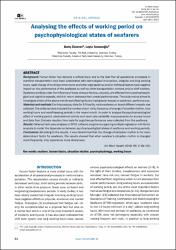| dc.contributor.author | Özsever, Barış | |
| dc.contributor.author | Tavacıoğlu, Leyla | |
| dc.date.accessioned | 2021-06-05T19:56:02Z | |
| dc.date.available | 2021-06-05T19:56:02Z | |
| dc.date.issued | 2018 | |
| dc.identifier.issn | 1641-9251 | |
| dc.identifier.issn | 2081-3252 | |
| dc.identifier.uri | https://doi.org/10.5603/IMH.2018.0013 | |
| dc.identifier.uri | https://hdl.handle.net/20.500.12960/108 | |
| dc.description | 0000-0002-9919-8226 | en_US |
| dc.description | 0000-0003-4926-2477 | en_US |
| dc.description | PubMed: 29939384 | en_US |
| dc.description | WOS:000436177100002 | en_US |
| dc.description.abstract | Background: Human factor has become a critical issue due to the fact that all operational processes in maritime transportation have been accelerated with technological innovations. Irregular and long working hours, rapid change of working environments and other organisational and/or individual factors have negative impact on the performance of the seafarers as well as other transportation workers and/or shift workers. Seafarers working under the influence of these stressor factors, naturally, are affected from psychophysiological and cognitive aspects, which in return decrease their overall performances. The study mainly aimed to investigate which of the above mentioned affecting factors had greater impact on seafarers' performances. Materials and methods: For this purpose. data for 14 healthy male seafarers on board different vessels was collected. The collected data included the number of port visits, frequency of change of circadian rhythm, total working hours and watchkeeping periods in the recent month. In order to analyse the psychophysiological effect of working period, electrodermal activity and heart rate variability measurements for arousal mood and data from 2-choice reaction time tests for cognitive performance were collected from the seafarers. Results: Obtained data was analysed in SPSS software programme applying multiple regression with factor analysis to model the dependence between psychophysiological states of seafarers and working periods. Conclusions: According to the results, it was determined that the change of circadian rhythm is the main determinant factor for seafarers. The results showed that when seafarer's circadian rhythm is changed more frequently. they experience more drowsiness. | en_US |
| dc.language.iso | eng | en_US |
| dc.publisher | Via Medica | en_US |
| dc.relation.ispartof | International Maritime Health | en_US |
| dc.rights | info:eu-repo/semantics/openAccess | en_US |
| dc.subject | Seafarer | en_US |
| dc.subject | Human Factor | en_US |
| dc.subject | Circadian Rhythm | en_US |
| dc.subject | Psychophysiology | en_US |
| dc.subject | Working Hours | en_US |
| dc.title | Analysing the effects of working period on psychophysiological states of seafarers | en_US |
| dc.type | article | en_US |
| dc.department | Denizcilik Fakültesi, Deniz Ulaştırma İşletme Mühendisliği Bölümü | en_US |
| dc.department-temp | [Ozsever, Baris] Piri Reis Univ, Maritime Fac, Istanbul, Turkey; [Tavacioglu, Leyla] Istanbul Tech Univ, Maritime Fac, Istanbul, Turkey | en_US |
| dc.contributor.institutionauthor | Özsever, Barış | |
| dc.identifier.doi | 10.5603/IMH.2018.0013 | |
| dc.identifier.volume | 69 | en_US |
| dc.identifier.issue | 2 | en_US |
| dc.identifier.startpage | 84 | en_US |
| dc.identifier.endpage | 93 | en_US |
| dc.relation.publicationcategory | Makale - Uluslararası Hakemli Dergi - Kurum Öğretim Elemanı | en_US |

















